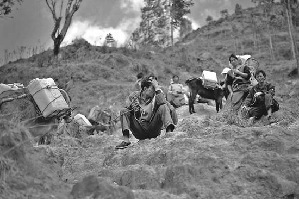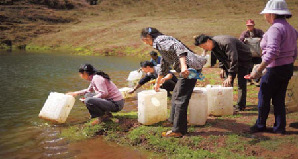Society
Dilemma in drought zones: To move or stay
By Peng Yining and Li Yingqing (China Daily)
Updated: 2010-04-21 07:00
 |
Large Medium Small |
|
 |
|
Getting drinking water has become a daily chore for residents of Dahuangdi village in Yunnan. LI QIANG / FOR CHINA DAILY
|
|
 |
|
Villagers in Dahuangdi have to climb for two hours to get drinking water from a nearby mountain reservoir.
|
As the high-lying village has no natural resources, any produce from its farms is used to feed the families living there. Residents have not even been able to find wild vegetables on the arid surrounding hills to ease the food shortage, said Li.
"Relocation is their only way out of drought environment," said Li Jianqin, deputy director of the county education department. "In some places, the environment is too harsh for people to make a living. People cannot change the situation. They can only leave."
No free land
Although farmer Li Zuquan admits he is tempted to move his family, he knows that relocation would bring very different problems. The big question, he said, is: "If we moved, would the government give us land?"
Farming is vital to the family. Li Zuquan earns a total of between 8,000 and 9,000 yuan from his beans and tobacco, which he grows on four mu (0.2 hectares) of hillside land, three mu of which is allocated by the village. As much as half of that income goes to tuition fees for his 13-year-old daughter and 8-year-old son.
"I don't have other skills," he said. "Farming at least gives us enough food. If we moved to another place, we would live in a better house with a city water supply, but how could I feed my family?"
Arable land in Nanhua is sorely limited, making it difficult to set aside areas for farmers relocated from remote regions, said Wang, head of Dahuangdi. She explained the county authorities use bulldozers to create space in towns for newcomers to build homes and plant crops, but the soil is usually far less fertile than in the mountains.
"Without land farmers can't survive," she said. "They are less competitive in the city. It is hard for even college graduates to find jobs, let alone farmers."
The cost of relocation is also a concern for many people. "Even if the government grants subsidies to farmers, they would still need to pay at least 20,000 to 30,000 yuan," said Wang.
Such an amount is way out of Li Zuquan's league.
The door to the family's small house is made of several pieces of wood. There is no lock, said Li, because they have nothing to steal. Inside is only a wooden bed, some wooden chairs and a strong odor of cow dung.
|
||||
"We can't move as we simply can't afford it," he said before adding he may have to borrow money, even though he is still paying off a bank loan of 1,000 yuan to cover the shortfall caused by an earlier drought.
Even for those who have already been relocated, it has been far from the perfect solution, prompting some of them to return to their hometowns just years later, said Ma Yongbin, of the Mouding water resource department.
All 10 of the households that were resettled 30 km from the drought zone in 2007 returned within two years.
"They found it hard to make a living in city. More importantly, they couldn't integrate into their new community or adapt to changes in the social environment," said Ma.
In Zelang, a predominantly Miao ethnic village in the eastern mountains of Yunnan, young people from all 33 households have headed to cities because of the drought. Only elderly people and children remain.
"A lot of people went to find a work in brick factories in Jiangxi province but most choose to come back in the end," said Wu Yingzhen, a 26-year-old primary school teacher in the village. "They (Miao people) don't have many choices because they are lacking in education. Some can't even speak putonghua. The income they make is usually not enough to cover the high costs of living in city. They can't pay for healthcare or school fees, so they only move out temporarily and use the money they earn to rebuild their mud house with cement."
Farmers should only relocate to urban areas if they are educated and can be competitive, said Wu.
Zhang Jijun, another primary school teacher in central Yunnan, agreed and added: "My students write in their homework about how they envy their parents and older brothers working in the city but they have no idea what it is really like."
People also choose to return to their farms simply because of homesickness or a "longing for their traditional culture", according to Yang Jialiang, head of Jiuwuji, the township that administers Zelang.
Wu Guobao, a senior researcher at the Chinese Academy of Social Sciences' rural development institute, agreed and said: "Sometimes, villagers move back as the new location is incompatible with their religious and cultural practices. They might also return over fears of losing connections with relatives, or if they feel lonely."
Every year, villagers across the township stage extravagant ceremonies to celebrate the "mountain gods", with drinking and dancing often lasting for several days. "Each village has a holy mountain and people are not allowed to cut trees and hunt there. People here have emotional connections with mountains, trees and animals."
Watching the trees wilt and die in the drought has been torture for Yang. "I feel terrible. These trees have probably lived for 100 years," he said.
Aside from the costs, the lack of farmland and the difficulty in resettling, some would not contemplate leaving their homes for a second.
Like millions of others in Southwest China, 72-year-old Li Huogui has lost all her crops and faces a daily arduous trek just to fetch drinking water for her family and cattle. Yet she insisted she would never move from her native Bixime, a village in Mouding county.
"If the government paid for us to move I would let my sons go, but I would rather die in my home," said the elderly woman, who is from the Yi ethnic group.
Moving from problems
China has launched relocation projects to alleviate poverty and improve people's living conditions since the 1980s, according to Wu, who is an expert on poverty alleviation.
The central government spent 6.7 billion yuan to resettle 1.4 million people in new homes between 2001 and 2005, he said.
"So far, for those living in extremely harsh conditions, relocation is the most effective way to solve the problem of poverty and natural disasters," he said.
The subsidies given by the government are relatively low, he said, meaning the poorest farmers cannot afford to move - even though they are usually the ones most in need of relocation.
However, as those moving away must abandon their farmland, the resettlement projects could indirectly be helping poor villagers.
"If the government selects the right location, one that has enough farmland and fully meets the relocated families' religious and cultural beliefs, I believe Chinese farmers would live a better life," he said.
Zhou Wenting in Beijing contributed to this story.
(China Daily 04/21/2010 page1)







